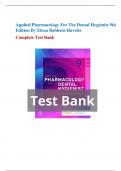Applied Pharmacology For The Dental Hygienist 9th
Edition By Elena Bablenis Haveles
Complete Test Bank
,Table Of Contents
Part I: General Principles
1. Information, Sources, Regulatory Agencies, Drug Legislation, And Prescription Writing
2. Drug Action And Handling
3. Adverse Reactions
Part II: Drugs Used In Dentistry
4. Autonomic Drugs
5. Nonopioid (Nonnarcotic) Analgesics
6. Opioid (Narcotic) Analgesics And Antagonists
7. Antiinfective Agents
8. Antifungal And Antiviral Agents
9. Antianxiety Agents
10. Local Anesthetics
11. General Anesthetics
Part III: Drugs That May Alter Dental Treatment
12. Drugs For The Treatment Of Cardiovascular Diseases
13. Drugs For The Treatment Of Gastrointestinal Disorders
14. Drugs For The Treatment Of Seizure Disorders
15. Drugs For The Treatment Of Central Nervous System Disorders
16. Adrenocorticosteroids
17. Drugs For The Treatment Of Respiratory Disorders And Allergic Rhinitis
18. Drugs For The Treatment Of Diabetes Mellitus
19. Drugs For The Treatment Of Other Endocrine Disorders
20. Antineoplastic Drugs
Part IV: Special Situations
21. Emergency Drugs
22. Pregnancy And Breast Feeding
23. Substance Use Disorders
24. Natural/Herbal Products And Dietary Supplements
25. Oral Conditions And Their Treatment
26. Hygiene-Related Oral Disorders
,Chapter 01: Information Sources, Regulatory Agencies, Drug Legislation, And Prescription
Writing
Haveles: Applied Pharmacology For The Dental Hygienist, 9th Edition
MULTIPLE CHOICE
1. Knowledge Of Pharmacology Aids The Dental Professional In
A. Obtaining A Patient’s Health History.
B. Administering Drugs In The Office.
C. Handling Emergency Situations.
D. Selection Of A Nonprescription
Medication.
E. All Of The Above.
ANS: E
All Of The Choices Are True. Because Many Of Our Patients Are Being Treated With Drugs,
Knowledge Of Pharmacology Helps In Understanding And Interpreting Patients’ Responses To
Health History Questions. Knowledge Of The Therapeutic And Adverse Effects Of Medications
Obviously Helps In Their Proper Administration In The Office. Emergency Situations May Be
Caused By Drugs Or Treated By Drugs; Thus, Knowledge Of Pharmacology Is Of Great Help,
Especially Because A Rapid Response Is Sometimes Required. A Clear Understanding Of The
Concepts Of Drug Action, Drug Handling By The Body, And Drug Interactions Will Allow The
Dental Practitioner To Make Proper Judgments And Grasp The Concepts Relevant To New Drug
Therapies On The Market.
DIF: Application
REF: Role Of The Dental Hygienist (Medication/Health History), Role Of The Dental Hygienist
(Medication Administration), Role Of The Dental Hygienist (Emergency Situations), Role Of The Dental
Hygienist (Nonprescription Medication) | Pp. 2-3 OBJ: 1
TOP: NBDHE, 6.0. Pharmacology
2. Which Of The Following Statements Is True Regarding Planning Appointments?
A. Whether Or Not Patients Are Taking Medication For Systemic Diseases Is Of
Little
Consequence In The Dental Office.
B. Asthmatic Patients Should Have Dental Appointments In The Morning.
C. Diabetic Patients Usually Have Fewer Problems With A Morning
Appointment Compared With Afternoon Appointments.
D. Both B And C Are True.
ANS: D
Asthmatic Patients Who Experience Dental Anxiety Should Schedule Their Appointments When
They Are Not Rushed Or Under Pressure Early In The Morning. Diabetic Patients Usually Have
Relatively Fewer Problems With A Morning Appointment. Patients Taking Medication For Systemic
Diseases May Require Special Handling In The Dental Office.
DIF: Comprehension
REF: Role Of The Dental Hygienist (Appointment Scheduling) | P.
3 OBJ: 1 TOP: NBDHE, 6.0. Pharmacology
, 3. Nutritional Or Herbal Supplements
A. Carry The U.S. Food And Drug Administration (FDA) Approval For Disease
States.
B. Are Not Drugs.
C. Can Cause Adverse Effects.
D. Will Not Interact With Other Drugs The Patient May Be Taking.
ANS: C
Nutritional Or Herbal Supplements Are Quite Capable Of Causing Adverse Effects. The Majority Of
Nutritional Or Herbal Supplements Do Not Carry FDA Approval For Treating Disease States. These
Supplements Are Drugs And Can Cause Adverse Effects And Interact With Different Drugs.
DIF: Comprehension
REF: Role Of The Dental Hygienist (Nutritional Or Herbal Supplements) | P.
3 OBJ: 1 TOP: NBDHE, 6.0. Pharmacology
4. Which Type Of Drug Name Usually Begins With A Lowercase Letter?
A. Brand Name
B. Code Name
C. Generic Name
D. Trade Name
ANS: C
Before Any Drug Is Marketed, It Is Given A Generic Name That Becomes The “Official” Name Of
The Drug. Each Drug Is Assigned Only One Generic Name Selected By The U.S. Adopted Name
Council, And The Name Is Not Capitalized. The Brand Name Is Equivalent To The Trade Name And
Is Capitalized. Although The Brand Name Is Technically The Name Of The Company Marketing The
Product, This Term Is Often Used Interchangeably With The Trade Name. The Code Name Is The
Initial Term Used Within A Pharmaceutical Company To Refer To A Drug While It Is Undergoing
Investigation And Is Often A Combination Of Capital Letters And Numbers, The Letters
Representing An Abbreviation Of The Company Name.
DIF: Comprehension REF: Drug Names | P. 4
OBJ: 3 TOP: NBDHE, 6.0. Pharmacology
5. A Drug’s Generic Name Is Selected By The
A. Pharmaceutical Company Manufacturing
It.
B. Food And Drug Administration (FDA).
C. U.S. Adopted Name Council.
D. Federal Patent Office.
ANS: C
Each Drug Is Assigned Only One Generic Name (E.G., Ibuprofen). It Is Selected By The U.S.
Adopted Name Council. The Generic Name Is Not Selected By The FDA Or The Federal Patent
Office. The Pharmaceutical Company Manufacturing The Drug Clearly Has An Influence On The
Generic Name Given Its Drug, But The Final Decision Is Not The Company’s.
DIF: Recall REF: Drug Names | P. 4 OBJ: 3
TOP: NBDHE, 6.0. Pharmacology
6. Which Of The Following Is True Concerning Generic And Trade Names Of Drugs?
A. A Drug May Only Have One Generic Name And One Trade
Name.




